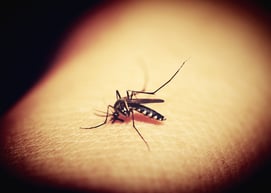Originally published : Wed, August 30, 2017 @ 12:26 PM

Updated : Mon, September 19, 2022 @ 2:14 PM
3.2 billion people across 106 countries and territories, live in areas at risk of malaria transmission. The serious and sometime fatal mosquito-borne disease is caused by the Plasmodium parasite – in 2015, malaria caused 212 million clinical episodes, and 429,000 deaths.
Malaria has been a public health problem in Brazil ever since it was brought to the region during its colonization. By the 1940s it is estimated that six to eight million infections and 80,000 malaria-related deaths occurred every year in the country.
Due to a concerted series of malaria control policies, Brazil has recorded a 76.8% decrease in malaria incidence between 2000 and 2014 – and effort which the country was praised by the WHO. In 2014, there were 143,910 of microscopically confirmed cases of malaria and 41 malaria-related deaths.
Part of Brazil’s malaria control policy involves the use of primaquine – a medication first made in 1946, to treat and prevent malaria. It is particularly effective against the Plasmodium vivax parasite that is prevalent in the Brazil.
Unfortunately primaquine can induce haemolytic anaemia in glucose-6-phosphate dehydrogenase (G6PD)-deficient individuals and may lead to severe and fatal complications. 330 million people worldwide are affected with G6PD deficiency, with recent studies suggesting the prevalence of the deficiency could be as high as 10% in Brazil.
Recently, molecular biologists from LGC enabled a cutting edge study in collaboration with researchers from Brazil and the London School of Hygiene and Tropical Medicine.
The researchers looked for mutations in a sample of 516 male volunteers that could be used as clinical indicators for G6PD deficiency that could lead to complications in people prescribed with primaquine.
Blood samples were collected from around Brazil at hospitals during surgeries, as well as using the local Brazilian radio stations to ask people to come and submit blood.
Needing a fast and efficient way to generate results in high throughput, the team turned to LGC's integrated genomics toolkit to facillitate the research. Each sample was screened against 24 KASP assays to assess the genetic bases of G6PD deficiency. In combination with the IntelliQube®,a fully automated point and click PCR system; the team collected the data in roughly three hours of instrument time and one hour hands on time.
KASP is a flexible, highly specific genotyping technology, which can be used to determine SNPs and InDels. KASP uses unlabelled oligonucleotide primers, which gives the technology a cost advantage and allows more data to be generated, increasing data quality.
The data indicates that approximately one in 23 males from the Alto do Juruá could be G6PD deficient and at risk of haemolytic anaemia if treated with primaquine. The authors conclude that routine G6PDd screening to personalize primaquine administration should be considered - particularly as complete treatment of patients with vivax malaria using chloroquine and primaquine, is crucial for malaria elimination.
The teams are continuing their collaboration to help further research in to treatments for malaria, and we can’t wait to see more!
To access the paper, please click here, or to see the IntelliQube in action and learn more about this automated PCR instrument click here.
Sources:
Malaria. (2017, July 13). Retrieved August 8, 2017, from https://www.cdc.gov/malaria/about/index.html
Maia, U. M., Batista, D. C., Pereira, W. O., & Fernandes, Thales Allyrio Araújo de Medeiros. (n.d.). Prevalence of glucose-6-phosphate dehydrogenase deficiency in blood donors of Mossoró, Rio Grande do Norte. Retrieved August 8, 2017, from http://www.scielo.br/scielo.php?pid=S1516-84842010000500017&script=sci_arttext&tlng=en
*For Research Use Only. Not for use in diagnostic procedures.

